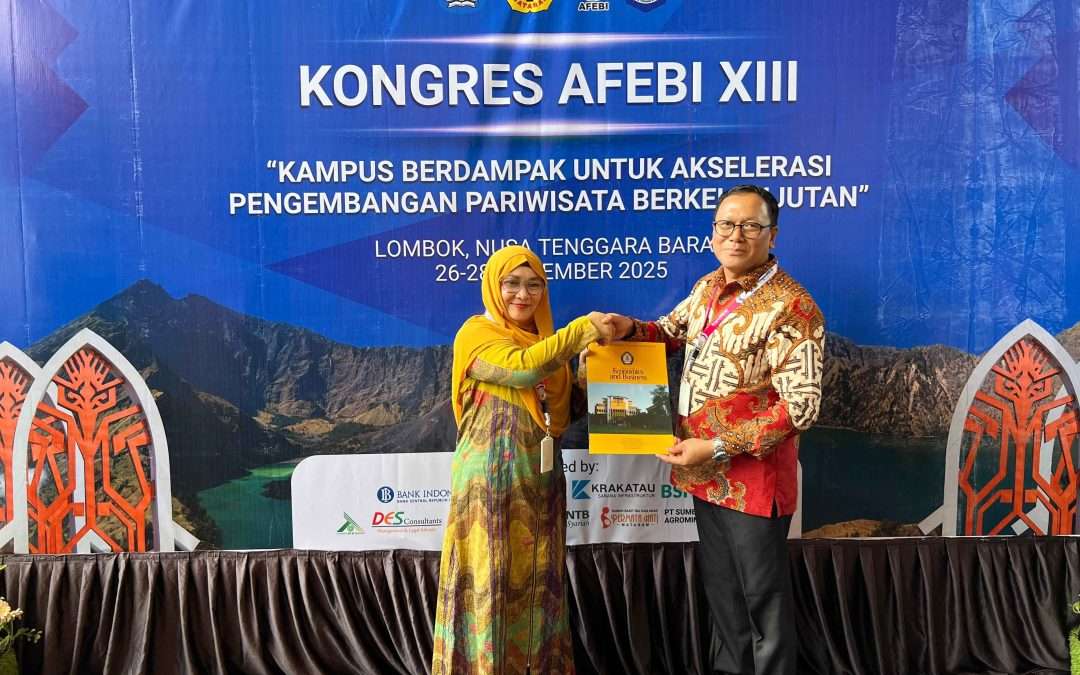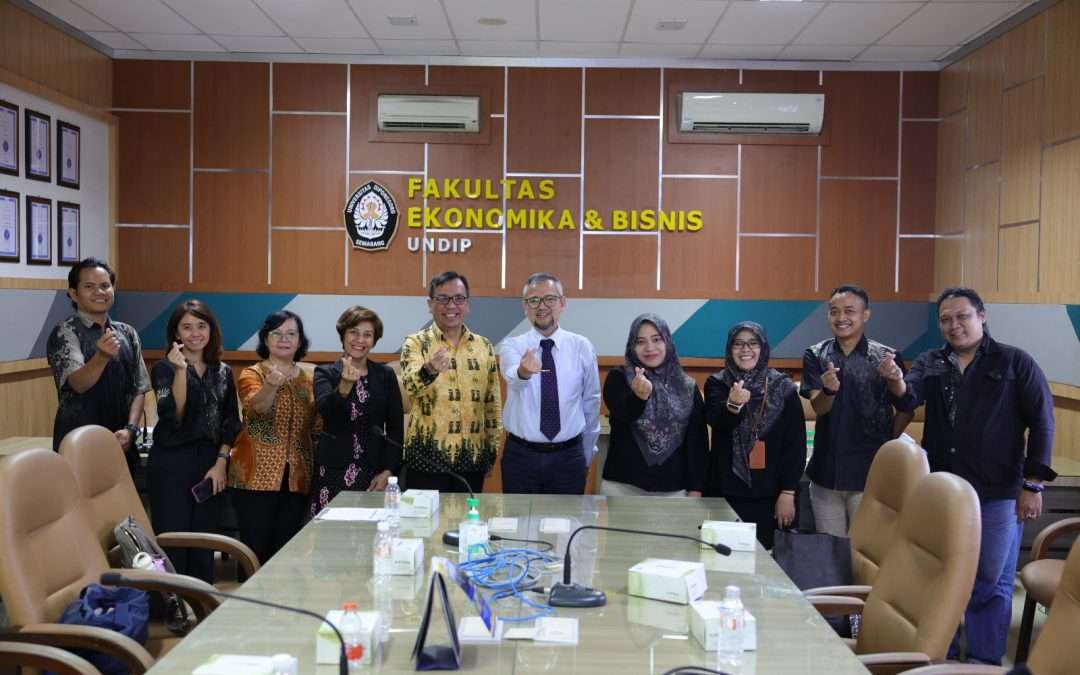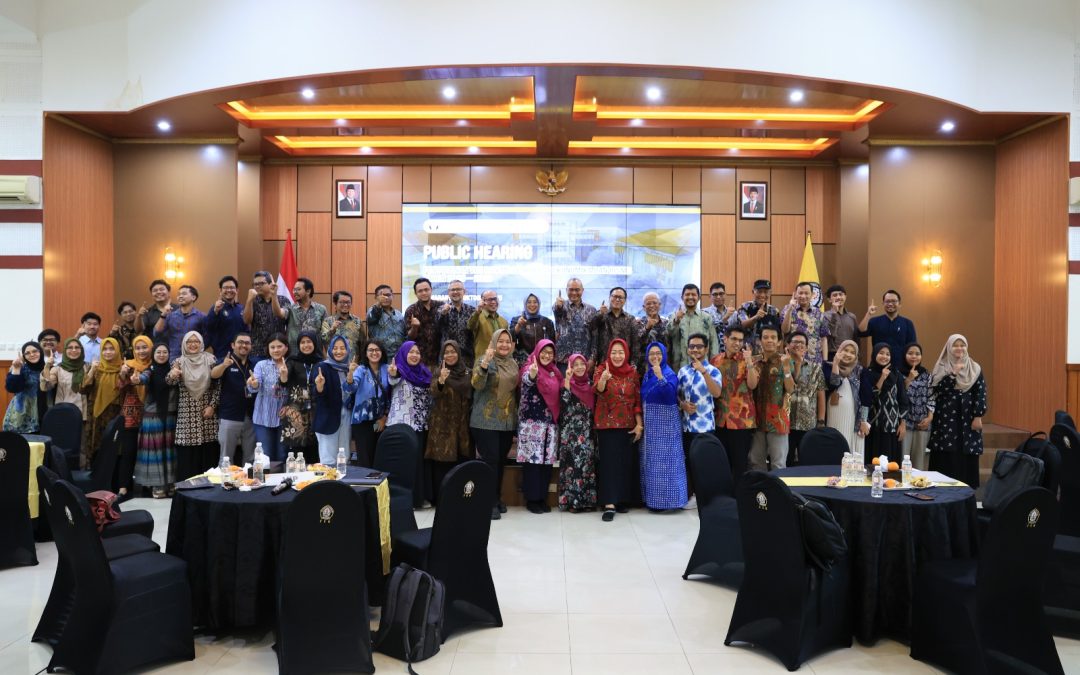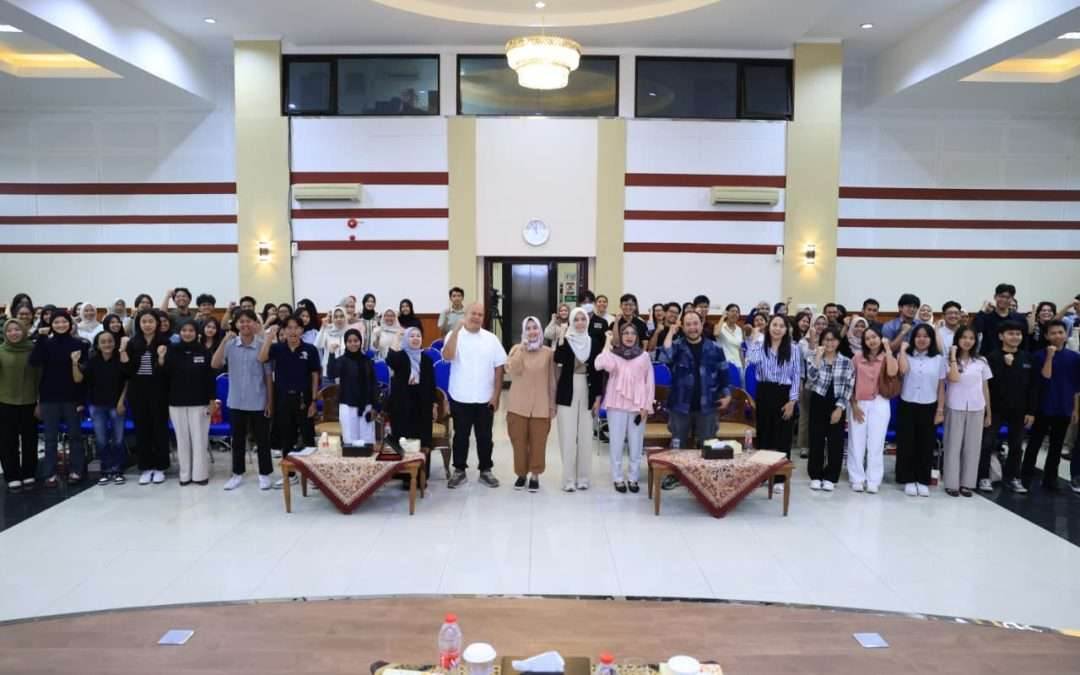
by manajemenfeb | Dec 3, 2025 | News
The Faculty of Economics and Business, Universitas Diponegoro (FEB Undip), together with the Faculty of Economics, Universitas Tidar (Untidar), Magelang, officially signed a Cooperation Agreement as an effort to strengthen academic networks and enhance the quality of cross-institutional learning. The agreement was formally signed by the respective Deans of both faculties, reflecting a shared commitment to building sustainable institutional collaboration.
This cooperation represents a strategic step in supporting the implementation of the Tri Dharma of Higher Education, which includes education, research, and community service. Through this agreement, both faculties reaffirm their commitment to synergize in improving academic quality, expanding the scope of collaboration, and strengthening their contribution to the development of highly competent human resources in the fields of economics and business.
The signing of the cooperation agreement took place as part of the series of activities of the 13th Congress of the Association of Indonesian Faculties of Economics and Business (AFEBI), held on November 26–27, 2025, at Aruna Senggigi Resort & Convention, Lombok, West Nusa Tenggara. This national congress carried the theme “An Empowered Campus for the Acceleration of Sustainable Tourism Development” and was attended by dozens of leaders from Faculties of Economics and Business from various universities across Indonesia.
As a national forum, the AFEBI XIII Congress served as a strategic platform to discuss the direction of economic and business education policies in Indonesia, strengthen inter-faculty collaboration, and encourage the role of higher education institutions in supporting sustainable regional development. The series of activities began with participant registration, followed by plenary sessions discussing AFEBI’s work programs, the presentation of accountability reports, and the establishment of a new management structure for the 2026–2028 period.
The congress agenda also featured a keynote speech from the Governor of West Nusa Tenggara and a presentation on higher education policies by the Ministry of Education, Science, and Technology. In addition, discussion forums involving faculty leaders further enriched the event by addressing the strengthening of academia’s role in supporting regional development, particularly in the sustainable tourism sector.
With the signing of this cooperation agreement during the momentum of the AFEBI XIII Congress, FEB Universitas Diponegoro and FEB Universitas Tidar Magelang demonstrated their strong commitment to building a productive, adaptive, and forward-looking institutional relationship. This synergy is expected to continue to grow and provide tangible contributions to the advancement of higher education, particularly within Faculties of Economics and Business in Indonesia.
by manajemenfeb | Nov 26, 2025 | News
Semarang, 20 November 2025 — Universitas Diponegoro has officially announced the opening of Tuition Fee (UKT) Adjustment submissions for Undergraduate and Diploma students for the Even Semester of the 2025/2026 Academic Year. The information was conveyed through an official circular numbered 983/UN7.A2/KU/XI/2025, addressed to all Deans of Faculties and Schools within Undip.
The UKT adjustment process refers to the Rector’s Decree Number: 180/UN7.A/HK/III/2025 regarding the Academic Calendar of Universitas Diponegoro for the 2025/2026 Academic Year, and is carried out in accordance with Rector Regulation Number 9 of 2021.
Penyesuaian UKT Genap 2025-2026
Types of UKT Adjustments Available for Students
In the announcement, the university outlines several types of adjustments students may apply for, including:
- Upgrading to a higher UKT category
- Downgrading to a lower UKT category
- Tuition fee reduction
- Temporary exemption
- Installment-based payment
- Payment postponement
- Other forms of adjustment determined by the Rector
This policy aims to accommodate students experiencing changes in financial circumstances or economic challenges within their families.
Official Schedule for UKT Adjustment Process
The submission and verification stages are carried out according to the following schedule:
| 1 |
24 November – 15 December 2025 |
UKT adjustment submission by students |
| 2 |
1 – 22 December 2025 |
Verification of submissions by Faculties/Schools |
| 3 |
23 December 2025 |
Deadline for Faculties/Schools to submit verified proposals to the University |
| 4 |
24 – 30 December 2025 |
UKT adjustment verification at the University level |
| 5 |
31 December 2025 |
Finalization of UKT adjustment results |
All submissions must be completed online via the official platform:
🔗 https://ukt.undip.ac.id
Students are advised to ensure that all required documents are complete to facilitate a smooth verification process.
Through this UKT adjustment policy, Universitas Diponegoro reaffirms its commitment to supporting students’ academic continuity and ensuring equitable access to higher education.
The circular is signed by Dr. Wasrib Kawedar, S.E., M.Si., Akt., on behalf of the Rector, serving as the Vice Rector for Planning, Finance, Resources, Business, and General Affairs of Universitas Diponegoro.

by manajemenfeb | Nov 19, 2025 | News
Semarang – The Directorate of Administrative Affairs (DITA) of Universitas Kristen Satya Wacana (UKSW) conducted an official visit to the Faculty of Economics and Business, Diponegoro University (FEB Undip), as part of a strategic initiative to enhance career development for administrative staff within UKSW.
The delegation was warmly received by the leadership of FEB Undip. During the presentation session, FEB Undip outlined its organizational framework, staff development systems, performance evaluation mechanisms, and various competency enhancement programs currently in place. These components served as the primary focus of the benchmarking activity due to their relevance and potential applicability to UKSW’s human resource management practices.
An interactive discussion followed, allowing both parties to exchange insights on implementation strategies, operational challenges, and best practices related to administrative staff development in higher education institutions. The dialogue provided valuable perspectives that strengthen both institutions’ commitment to improving the professional capacity of their administrative personnel.
This visit is expected to assist DITA UKSW in formulating more structured, adaptive, and sustainable career development policies and programs. The activity concluded successfully and further strengthened the collaborative relationship between UKSW and FEB Undip.

by manajemenfeb | Nov 7, 2025 | News
Semarang – The Faculty of Economics and Business, Diponegoro University (FEB Undip), held a Public Hearing for the formulation of its Vision and Mission, as well as the discussion of the Draft Strategic Plan 2025–2029, on Thursday, October 30, 2025, at the Pertamina Hall, FEB Undip.
The event was attended by representatives of students, lecturers, academic staff, alumni, and external stakeholders. Through this forum, FEB Undip reaffirmed its commitment to providing high-quality business education, fostering global competitiveness, and delivering a positive impact on society.
In his opening remarks, the Dean of FEB Undip emphasized that this new vision and mission formulation is an important step in strengthening the faculty’s role as one of the largest at Diponegoro University, contributing to Undip’s goal of becoming a World Class University (WCU) and reaching the QS Top 500 by 2025–2029.
The strategic plan also highlights the importance of Good University Governance, data-driven decision-making (evidence-based management), and the development of adaptive educational and research services that respond to global challenges and changes.
Through this Public Hearing, all members of the FEB Undip academic community were invited to actively participate by sharing constructive ideas and feedback. Their contributions are expected to enrich the substance of the vision, mission, and strategic direction of the faculty for the next five years.
This activity also reflects FEB Undip’s commitment to collaboration and transparency in the formulation of inclusive and participatory strategic policies—realizing higher education that is both dignified and impactful.

by manajemenfeb | Oct 31, 2025 | News
Semarang (October 29, 2025) – The Faculty of Economics and Business, Universitas Diponegoro (FEB Undip), held a guest lecture titled “Empowering Young Creators Through Real Branding & Marketing Experience”, featuring Ignatius Untung, Chief Marketing Officer (CMO) of Biensi Fesyenindo, as the keynote speaker.
The session took place at the Pertamina Hall, FEB Undip, and was attended by students from various study programs.
During the lecture, Ignatius Untung shared his professional insights and experiences on branding and marketing practices within the modern business landscape. He emphasized the importance of creativity, innovation, and market understanding in developing strategies that align with current consumer behavior and business dynamics.
Participants were also challenged to showcase their best ideas through business plan and content creation projects relevant to their target markets. This interactive approach allowed students to connect academic theories with real-world marketing practices and industry applications.
The session was moderated by Zelika Nidya Damarani, S.T., M.M., a Management lecturer at FEB Undip, who guided the discussion and linked theoretical perspectives with practical business contexts.
Through this activity, FEB Undip aims to inspire students to enhance their creativity, broaden their knowledge, and foster innovation as part of the globally competitive young generation.
This guest lecture also reflects the faculty’s ongoing commitment to providing experiential learning that bridges academia and industry.
by manajemenfeb | Oct 28, 2025 | News
Semarang, October 27, 2025 – Diponegoro University has once again made a remarkable achievement at the national level. The EDIBLUE Team from Diponegoro University proudly secured 2nd Place Nationally in the Scientific Paper category of the National Student Competition in the Field of Business, Management, and Finance (KBMK) 2025.
The competition was organized by the Directorate of Learning and Student Affairs (Belmawa), under the Directorate General of Higher Education, Ministry of Education, Science, and Technology (Kemdiktisaintek), and was held on October 23–26, 2025, at Multimedia Nusantara University (UMN), Tangerang.
KBMK is an annual prestigious competition aimed at strengthening collaboration between academia, industry, and government sectors. It brings together outstanding students from various universities across Indonesia to compete in five divisions: Business Planning, Investment Research, Investigative Financial Auditing, Research and Appropriate Technology Commercialization, and Scientific Writing.
In this competition, the EDIBLUE Team consisting of Berlian Virgin Caprillita (Management 2023) and Fitra Ari Aditya (Biology 2021) achieved an outstanding accomplishment under the supervision of Ardiaz Ajie Aryandika, S.Kom., MBA, a lecturer from the Faculty of Economics and Business, Diponegoro University.
Their paper, entitled “Seapack: Innovative Edible Food Packaging Based on Jepara Seaweed as a Solution for Natural Resource Downstreaming and Strengthening the Eco-Friendly Chemical Industry,” presents a creative idea for developing edible packaging made from Jepara’s local seaweed. This innovation offers an environmentally friendly alternative to conventional plastic packaging, aligning with global sustainability trends in the food and chemical industries.
Through their research, the team aims to contribute to reducing plastic waste in food packaging while promoting the economic empowerment of coastal communities by utilizing the abundant local seaweed potential along the northern coast of Central Java. The project also demonstrates strong potential for commercialization, combining sustainability with local economic development.
Their advisor, Ardiaz Ajie Aryandika, S.Kom., MBA, expressed his pride in the team’s achievement, stating, “This work shows how cross-disciplinary collaboration between management and biology students can lead to tangible solutions for modern industry challenges. It embodies the spirit of sustainable entrepreneurship that FEB UNDIP continuously strives to foster.”
This achievement highlights Diponegoro University’s commitment, particularly through the Faculty of Economics and Business, to supporting student innovation, academic excellence, and contributions to environmental sustainability.
Congratulations to the EDIBLUE Team for their dedication and outstanding achievement!




